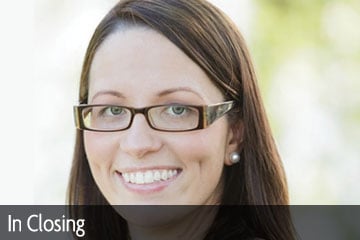
Full disclosure. I’m a total geek. So, when our legal division enshrined knowledge management into one of our teams, I was like a kid in a candy store.

Full disclosure. I’m a total geek. So, when our legal division enshrined knowledge management into one of our teams, I was like a kid in a candy store.
For us, KM encompasses the sharing of information with our in-house legal team and our clients, as well as the supporting records/information management systems. In the past, our “KM system” was, in fact, knowledge locked in the heads of our more seasoned lawyers and documented in a relatively unknown paper filing system known as the “G-files” (named for its supposed general content, though somewhat surprisingly named given the specific nature of the files they often housed, but I digress). Information that was electronically available was “found” within a sea of documents, as part of an outdated system within limited functionality. While this certainly inspired creativity, as people sought innovative (though impractical) “work-arounds” such as lengthy subject lines, infinite folders and individualized naming conventions, the value of the information in the system easily became lost in the raised eyebrows of our newer recruits.
Because of this and particularly following the Canada Mortgage and Housing Corporation’s recent implementation of a “Results Only Work Environment,” we needed to adapt our practices for a world where coming into the office is no longer the default and paper is the exception not the rule.
While our approach to KM is changing, it isn’t “out with the old and in with the new.” Instead, it was about shifting the focus to preserve what had previously worked well, while re-shaping it so that we (and our clients) are better equipped moving forward to deliver on the CMHC’s vision. Here is a snapshot of what we’re doing to help modernize our team:
Our previous KM tool for legislative monitoring was neatly packaged and highly centralized. For a KM geek like myself, this admittedly sounds great in theory, but in reality, the process could seem stiff at times with a standardized approach and formal client memos, which unfortunately could easily become the dreaded item on the “to do” list. We also knew that as thrilling as the law is to us, our clients might not have viewed our reporting as being quite as interesting as an episode of Matlock or Suits. We saw this an opportunity to re-think our approach with a focus on targeted client outreach and greater shared responsibility.
Our new model is grounded in real-time, flexible reporting where teams (through identified KM champions/subject matter experts) determine what works best for their specific client groups. More recently, we have been facilitating knowledge sharing within our team and to our clients through a related KM tool — our “Speaker Series” whereby external subject matter experts present to us on a particular topic — such as our latest one on blockchain. All of this with the hopes of staying current, learning together and sharing meaningfully.
Thankfully, CMHC is in the process of a major technological shift, which will bring better records management and more collaboration tools. With this, we will see greater search capabilities as we trade in our G-files and uncommon naming conventions in favour of metadata searches. More importantly, we will welcome the arrival of more collaborative spaces and tools where, as a legal division, we can safely exchange information in real-time on division-specific or more general legal developments, without the need to clutter up email boxes or have meetings on-site. As with our legislative monitoring KM tool, we are working with identified KM champions on each team to ensure we build a system that preserves important knowledge and precedents in our legacy files but which better equips us for the digital world ahead.
This is certainly an exciting journey to be on, but for a team (and profession) that has been heavily paper-based, this is no easy task. We are still early days in our transition with a lot still to do and tweaks still to be made, but we are definitely inspired by what’s ahead!
Karen E. Sadler is senior counsel, legal services division with Canada Mortgage and Housing Corporation. This is the third in a six-part series on the organization’s transformation initiative.